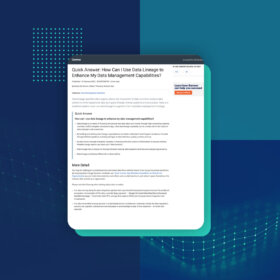
What happens to your data as it flows throughout your organization? Why is data lineage important for data management? Where does lineage fit into your enterprise metadata management strategy?
Discover the answers to these questions and more in a new Gartner Quick Answer, which addresses the question “How Can I Use Data Lineage to Enhance My Data Management Capabilities?” MANTA is mentioned as a vendor focusing specifically on data lineage.
The Value of Enterprise Metadata Management
Managing metadata—data that describes data—is imperative for medium and large enterprises today. Data lineage, a key deliverable of data management, is a critical component of a successful enterprise metadata management strategy.
By specifying and documenting data lineage, your company can identify actionable insights that have a tangible impact on business operations. For example, metadata visibility makes it possible to eliminate anecdote-driven decisions once and for all. Proper metadata management can also bolster data governance, make migration to the cloud smoother, and increase the value of data analytics.
Bolster Your Data Management Strategy with Data Lineage
By mapping where data comes from, where it goes, and how it changes along the way, your company can enhance its data management capabilities and unlock insights hidden within enterprise metadata.
“Data lineage is a means of following the journey that data takes as it moves through data processing systems. Just like a traffic navigator smartphone app, a live data lineage capability can be a handy tool in the hands of data managers and consumers,” write Gartner, Inc. researchers.
With lineage, technical and non-technical teams alike can see what happens to data as it flows through various complex systems. Gartner, Inc. researchers also write that “[by] building and utilizing data lineage, organizations can better understand what happens to data as it travels through different pipelines, including changes to data definition, quality, curation and use.”
Best practices when introducing data lineage to your organization include implementing augmented data cataloging and metadata management software, validating end-to-end data lineage, and verifying metadata sources.
Learn More from Gartner’s Quick Answer
Interested in learning more about how data lineage can improve your enterprise metadata management? Get your copy of the Gartner Quick Answer today, with compliments from MANTA.

Library